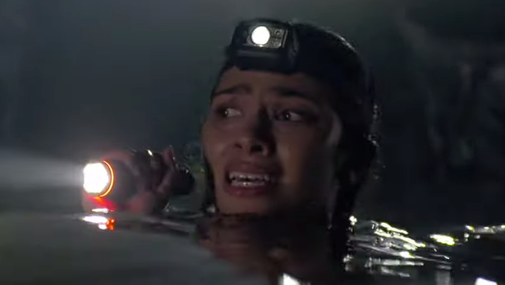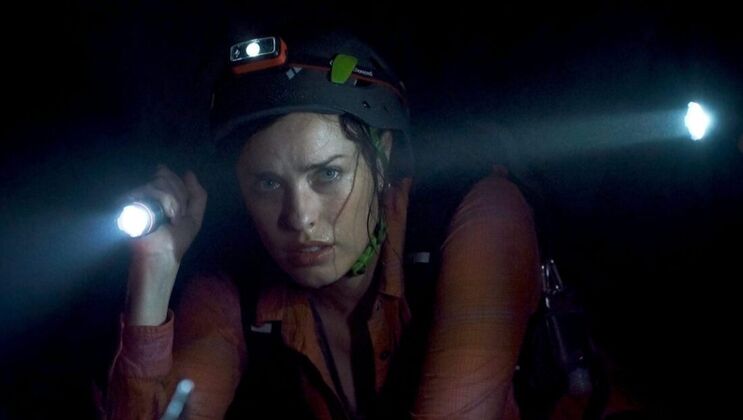[Review] 'Black Water: Abyss' is an Intense Creature Feature Swimming with Claustrophobic Terror8/4/2020  With gathering in large groups and international travel still faraway dreams amidst the ongoing pandemic, getting out into nature remains one of the few activities one can still employ to escape the drudgery of a quarantined life during this, the strangest summer in living memory... ...Of course, nature brings its own slew of potential dangers, as evidenced in director Andrew Traucki’s latest film, Black Water: Abyss. A sequel to the 2007 based-on-a-true-story crocodile creature feature Black Water (also directed by Traucki, and David Nerlich), Abyss is a controlled monster film that utilizes themes of deception and darkness to build dread that engulfs the viewer just as effectively as those long, long rows of croc teeth. Written by Ian John Ridley and Sarah Smith, the film follows on-the-rocks couple Jennifer (Jessica McNamee) and Eric (Luke Mitchell) on a trip to explore a hidden cave in the wilds of Northern Australia. They’ve recruited fellow couple Yolanda (Amali Golden) and Viktor (Benjamin Hoetjes) to tag along, all of them under the guidance of Eric’s ranger friend Cash (Anthony J. Sharpe). Despite the camaraderie and general merriment between the band of buddies, it quickly becomes clear that there is tension amidst the group, waiting to strike just under the surface, both amongst and between the couples. Once they make their way down into the previously unexplored cave, it’s not long before their dreamlike adventure turns into a waking nightmare. An encroaching storm soon traps them underground, leaving them to fend with rising water, mounting fear, and one of Australian wildlife’s most vicious predators. Black Water: Abyss is a film built on tension. Thematically, the viewer knows from the get-go that these characters are not being completely truthful with one another; the slights, jabs, and strained looks exchanged between them all betray their jovial sense of exploration. As their situation becomes more precarious and escape routes diminish, patience dwindles and revelations bubble out, though each unmasked secret is written in such a way that it adds to the mounting tension rather than relieves it, a brilliant touch on the part of Ridley and Smith. There are layers to each secret as well; every added bit of information from one twists the knife even further into the other’s revelations. What was poisoning each of them to keep hidden aboveground is now to their detriment to unveil underground. The film is also, visually, a tense watch. Long, lingering shots of eerily calm wilderness and menacing trees as the characters drive further and further from civilization. A stone still crocodile perched on the banks of a muddy river, a predator content to wait as long as it must before it strikes. Moving into the darkness of the cave also helps increase the sense of dread. It is here where the bulk of the movie takes place, and here where cinematographer Damien Beebe’s camera work becomes grainy, gritty, and grimy in the best possible way. The darkness restricts both the characters and the viewer, and the use of close-up shots and overall claustrophobic camera movements heighten our awareness of the unknown, and therefore our terror. We know something is in that water with them. We know. But where is it? And when will it emerge? Abyss borrows a few tricks from the playbooks of films like The Descent and 47 Meters Down--films that also utilize darkness to their advantage--as well as making sure its watery beast of prey is only glimpsed here and there: a flick of scaly tail, a flash of teeth, a quick blink of beady, yellow eye a la Jaws, but once the threat of the crocodile is established, it moves away from reference and homage and builds its own brand of dread. There is excellent use of silence and the small, quiet sound of lapping water in the middle third of the film; a smart, effective choice that makes it impossible for the viewer to predict when and where the crocodile will appear next. All of this helps to draw the viewer into the increasingly dire stakes. The cast deliver solid performances as well, staying grounded and believable as both the tension and the water rises around them. Golden and Hoetjes in particular had great chemistry as a couple at once devoted to yet unsure of one another in the aftermath of a cancer remission. Some of the drama doesn’t get as much room to breathe, and there’s some antiquated gender roles that come into play when the group elects to split up, but for the most part the interpersonal conflicts between the characters are delivered believably. Like all horror movies, some suspension of disbelief is required, but never to the point where it drastically detracts or distracts. Overall, Black Water: Abyss is a thrilling, dark, fun ride through unknown caves, murky waters, and slimy secrets. The film knows how to build dread and never overplays its hand when it comes to its main star, the crocodile, and this restraint serves the film well. Those that like smart, intense, well-shot creature features and relish claustrophobic horror that makes excellent use of darkness and sound will enjoy this watery sequel. Pair it with last summer’s Crawl or this year’s Deep Blue Sea 3 for an aquatic horror double feature that will make you reconsider just how bad it is to be stuck inside after all… Black Water: Abyss comes to VOD from Screen Media August 7th. By Craig Ranallo
0 Comments
Leave a Reply. |
Archives
March 2023
|


 RSS Feed
RSS Feed